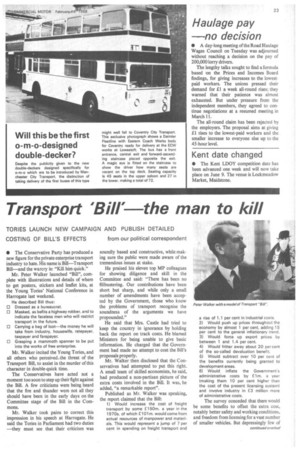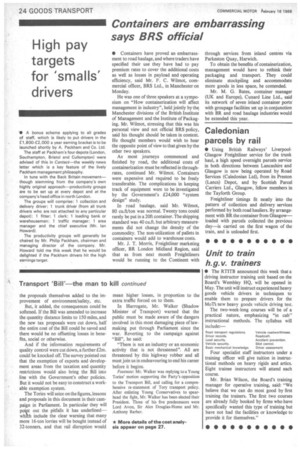Transport Rill' the man to kill
Page 25

Page 26

If you've noticed an error in this article please click here to report it so we can fix it.
TORIES LAUNCH NEW CAMPAIGN AND PUBLISH DETAILED COSTING OF BILL'S EFFECTS from our political correspondent
• The Conservative Party has produced a new figure for the private enterprise transport industry to hate. His name is Bill—Transport Bill—and the warcry is: "Kill him quick."
Mr. Peter Walker launched "Bill", complete with illustrations and details of where to get posters, stickers and leaflet kits, at the Young Tories' National Conference in Harrogate last weekend.
He described Bill thus: O Dressed as a bureaucrat.
O Masked, as befits a highway robber, and to indicate the faceless men who will restrict transport in the future.
O Carrying a bag of loot—the money he will take from industry, housewife, ratepayer, taxpayer and fa repayer,
o Grasping a mammoth spanner to be put into the works of free enterprise.
Mr. Walker incited the Young Tories, and all others who perceived., the threat of the Transport Bill, to assist in the murder of this character in double-quick time.
The Conservatives have acted not a moment too soon to step up their fight against the Bill. A few criticisms were being heard that the fire and thunder were not all they should have been in the early days on the Committee stage of the Bill in the Commons.
Mr. Walker took pains to correct this impression in his speech at Harrogate. He said the Tories in Parliament had two duties —they must see that their criticism was soundly based and constructive, while making sure the public were made aware of the tremendous issues at stake.
He praised his eleven top MP colleagues for showing diligence and skill in the Committee and said: "There has been no filibustering. Our contributions have been short but sharp, and while only a small number of amendments have been accepted by the Government, those who know the problems of transport recognise the soundness of the arguments we have propounded."
He said that Mrs. Castle had tried to keep the country in ignorance by holding back the report on track costs. He blamed Ministers for being unable to give basic information. He charged that the Government had made no attempt to cost the Bill's proposals properly.
Mr. Walker then disclosed that the Conservatives had attempted to put this right. A small team of skilled economists, he said, had produced a non-partisan picture of the extra costs involved in the Bill. It was, he added, "a remarkable report".
Published as Mr. Walker was speaking, the report claimed that the Bill:
1) Would increase the cost of freight transport by some £150m. a year in the 1970s, of which £101m. would come from actual resources of manpower and materials. This would represent a jump of 7 per cent in spending on freight transport and a rise of 1.1 per cent in industrial costs.
2) .Would push up prices throughout the economy by almost 1 per cent, adding 15 per cent to the general inflationary trend.
3) Would force up export prices by between 1 and 1.4 per cent.
4) Would fritter away about 20 per cent of the so-called devaluation benefit.
5} Would subtract over 10 per cent of the benefits currently being granted to development areas.
6) Would inflate the Government's administrative costs by £1m. a year imaking them 10 per cent higher than the cost of the present licensing system) and involve industry in £3 million more of administrative costs.
The survey conceded that there would be some benefits to offset the extra cost, notably better safety and working conditions, and freedom from licensing for a vast number of smaller vehicles. But depressingly few of
the proposals themselves added to the improvement of environment/safety, etc.
But, it added, the consequences could be softened. If the Bill was amended to increase the quantity distance limits to 150 miles, and the new tax proposals were cut down, half the entire cost of the Bill could be saved and there would be no offsetting losses in benefits, social or otherwise.
And if the information requirements of quality control were cut down, a further £2m. could be knocked off. The survey pointed out that the exemption of exports and development areas from the taxation and quantity restrictions would also bring the Bill into line with the Government's other policies. But it would not be easy to construct a workable exemption system.
The Tories will seize on the figures, lessons and proposals in this document in their campaign in Parliament. In particular they will poipt out the pitfalls it has underlinedwhikh include the clear warning that many more 16-ton lorries will be bought instead of 32-tanners, and that rail disruption would mean higher losses, in proportion to the extra traffic forced on to them.
In Harrogate, Mr. Walker (Shadow Minister of Transport) warned that the public must be made aware of the dangers involved in this most damaging piece of lawmaking put through Parliament since the war. Reverting to the campaign against "Bill", he said: "There is not an industry or an economic activity that is not threatened". All are threatened by this highway robber and all must join us in endeavouring to end his career before it begins.
Footnote: Mr. Walker was replying to a Young Tories' motion supporting the Party's opposition to the Transport Bill, and calling for a comprehensive re-statement of Tory transport policy. After enlisting Young Conservatives to spearhead the fight, Mr. Walker has been elected their President. Three of his five predecessors were Lord Avon, Sir Alex Douglas-Home and Mr. Anthony Barber.




















































































































